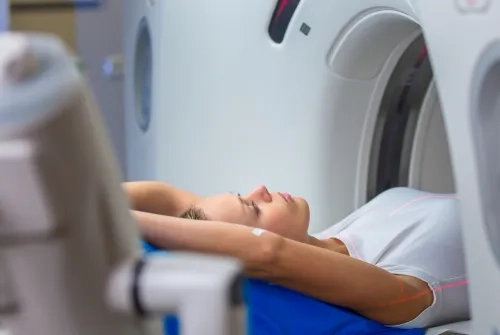Alo Yeditepe
Alo Yeditepe
Gastroenterology Procedures
Remarkable advances have been made in gastroenterologic procedures in recent years, with an ever expanding field of application. This means that much of the fear about these procedures is based on myth. In reality, the quality and precision of endoscopic equipment and devices, which are the basis of endoscopic diagnosis, has greatly improved, and Yeditepe University Hospital patients benefit from stateof - the-art techniques and technology.
Over 20 years have passed since the development of the videoscope. Compared to diagnostic procedures using other medical instruments, endoscopic diagnosis facilitates more accurate results through biopsies, and minimally invasive treatment such as the use of endotherapy instruments to remove polyps.
Nowadays, it is possible not only to diagnose whether lesions are benign or malignant, but also to make on the spot treatment decisions based on factors such as their size, depth, and how atypical they are. Sedationinducing a state of drowsiness before the procedure - is frequently used to minimize anxiety and discomfort during the endosocopy procedure.
Endoscopy
Endoscopy allows examination of the esophagus, stomach, and duodenum. Diagnostic observations are made concerning focal benign or malignant lesions, gastritis ulcers and helicobacter pylori infection. Helicobacter pylori is a bacteria which lives in human stomach and can cause gastritis, ulcers and also gastric carcinoma. It may also cause upper abdominal pain, belching, nausea, vomiting and abdominal bloating. When we reveal the presence of the microbe, it needs to be eradicated.
What Are The ‘alarm symptoms’ That Indicate The Need For Endoscopic Examination?
1- New onset symptoms starting over the age of 50.
2- Family history of esophageal or gastric cancer
3- Unintended weight loss
4- Persistent vomiting or vomiting with blood
5- Bloody or black stools
6- Difficulty in swallowing
7- Iron deficiency anemia
8- Diarrhea in patients suspected of having small-bowel disease (eg, celiac disease)
Endoscopic procedures can be used for diagnostic and therapeutic purposes. Common therapeutic endoscopic procedures include polypectomy, dilation of strictures, stent placement, removal of foreign bodies, gastrostomy (for patients who cannot swallow), treatment of GI bleeding with injection, banding, coagulation, sclerotherapy, and removal of limited malignant lesions.
Colonoscopy: Catching Problems Early
Colonoscopy allows examination of the entire colon and rectum, and frequently the terminal ileum. Screening colonoscopy should be performed everyone older than 50 years old. With colonoscopic examination we can detect polyps and remove them. (Polyps can turn to cancer in 5-10 years; after removal, the cancer risk is close to zero). Follow-up colonoscopies should be done every few years, depending on the polyp type. The diagnosis of other disease of the colon (like ulcerative colitis) can be made by this method.
When Should You Undergo a Colonoscopy?
Colonoscopy is generally indicated in the following circumstances:
1- Evaluation of unexplained GI bleeding (after an upper GI source has been excluded)
2- Presence of fecal occult blood
3- Unexplained iron deficiency anemia
4- Screening and surveillance for colonic neoplasia (every 5-10 years over the age of 50, or if there is a family history of colon cancer or colonic polyps 10 years earlier than the index family member)
5- Clinically significant diarrhea of unexplained origin
What is ERCP?
Endoscopic retrograde cholangiopancreatography, or ERCP, is a diagnostic procedure designed to examine diseases of the liver, bile ducts and pancreas. To minimize discomfort, ERCP is performed under intravenous sedation, usually without general anesthesia.
Frequently, therapeutic measures can be performed at the time of ERCP to remove stones in the bile ducts or to relieve obstruction of the bile ducts.
During ERCP, the endoscope will pass through your mouth, esophagus and stomach into the small intestine. After finding of common bile duct at the second part of the duodenum, entrance of bile duct will be dilated and stones will be removed.
Who should undergo ERCP?
ERCP is generally indicated in:
1-Jaundice
2-Common bile duct stones
3-To drain the obstructed bile ducts due to tumor of strictures and to place the stents
Endoscopic Ultrasound
Endoscopic ultrasound (EUS) is a technique whereby an ultrasound (US) transducer is incorporated into the tip of the endoscope. This provides high-resolution images of the GI wall and adjacent structures. Endoscopic ultrasound (EUS)-guided sampling, including EUS-guided fine needle aspiration (EUS-FNA) can be performed in submucosal tumors, pancreatic solid masses and cystic-appearing lesions, and other gastrointestinal tumors.
Does an Ultrasound Examination Make Sense For You?
EUS is generally indicated for:
1- Staging tumors of the GI tract pancreas, and bile ducts.
2- Evaluating abnormalities of the GI tract wall or adjacent structures.
3- Tissue sampling of lesions within or adjacent to, the wall of the GI tract.
4- Evaluation of abnormalities of the pancreas, including masses pseudocysts, cysts, and chronic pancreatitis.
5- Evaluation of abnormalities of the biliary tree.
Capsule Endoscopy
Small-bowel video capsule endoscopy is the first-line investigation in patients with obscure gastrointestinal bleeding.Other common usage areas are suspected small intestinal tumors and refractory malabsorptive syndromes.
Double Balloom Enteroscopy
Double balloon enteroscopy is an effective and safe technique for small-bowel examination. With this technique, we can diagnose suspected small bowel lesions, as well as, we obtain the biopsies. We sometimes perform treatment, depending on the lesion.
This content was prepared by Yeditepe University Hospitals Medical Editorial Board.
”
See Also
- What is a Liver Transplant, How is it Done? and Who is it For?
- What is Constipation? What Helps With Constipation?
- What is Hepatitis B? What are its symptoms? How is it Transmitted?
- How to Cleanse the Liver the Fastest?
- Who Gets Colon Cancer?
- What is Colostrum? What are the Benefits of Colostrum Milk?
- Stomach Cancer Causes, Symptoms and Treatment
- What is Colon (Intestinal) Cancer? Symptoms and Treatment
- What Causes Nausea? What is Good for Nausea?
- What is Heartburn? What is Good for Heartburn?
- What is Fatty Liver?
- What is Good for Diarrhea? How to Treat Diarrhea?
- What is a Probiotic? What Are Its Benefits?
- What Is Reflux?
- Non-Surgical Treatment of Reflux
- What are the Nutrients That Stress Digestion?
- What are Capsule Treatment Methods in Stomach, Small, and Large Intestine Screening?
- Pay Attention When Consuming These Nutrients!
- Mediterranean Diet Prevents Developing Colon Cancer!
- Breakthrough Innovations in Colon Cancer
- Diarrhea and Constipation Increased in Those with Irritable Stomach
- I Was Waking Up With Stomach Pain, I Fell Better After Endoscopic Fundoplication
- Anemia, Constipation, and Vomiting of Unknown Cause Can Be Dangerous
- As the Western Diet Increases, So Does Stomach Cancer
- Ramadan Warning for Those Who Experience Stomach Disorders
- Causes and Treatment of Abdominal Bloating
- Hepatitis Disease Poses Risk for Esophageal Varices
- The Giant Stones In The Biliary Tract Of 71-Year-Old Patient Were Removed Without Surgery
- How Is Stomach Infection Transmitted?
- What is Gastroesophageal Reflux Disease?
- Capsule Endoscopy
- Stretta / Endoscopic Reflux Treatment
- Fundoplication Method / Endoscopic Reflux Treatment
- Throat Reflux
- Techniques and Applications Used in Gastroenterology
- Irritable Bowel Syndrome (IBS)
- How to Swallow the Drug?
- Non-Surgical Reflux Treatment
Alo Yeditepe




